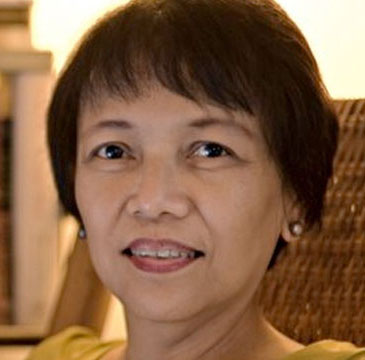"x x x.
‘Lawyer or liar?’
 Marites Dañguilan VitugIf the 3,000 lawyers or so gathered in Davao City for the Integrated Bar of the Philippines (IBP) national convention were seriously listening to the speakers, they would not run out of New Year’s resolutions.
Marites Dañguilan VitugIf the 3,000 lawyers or so gathered in Davao City for the Integrated Bar of the Philippines (IBP) national convention were seriously listening to the speakers, they would not run out of New Year’s resolutions.Every two years, members of the bar from various parts of the country meet in a big way, a culmination of chapter and regional meetings and a massive networking that, this time, took place in the humongous SMX convention center here. It was also the 40th anniversary of the IBP which had its roots in the martial-law era.
To make it worth everyone’s while and to compel the lawyers to attend the sessions, the 4-day convention was made part of their mandatory continuing legal education or MCLE.
But more than the de rigueur lectures, the challenges hurled by some of the speakers should make the lawyers think hard and reflect on their work—from changing mindsets to improving public confidence in the legal profession and taking a critical view of Supreme Court decisions.
‘Don’t be parochial’
Sen Edgardo Angara, the oldest living former IBP president, urged his colleagues to undergo a mind shift and emerge from their narrow day-to-day concerns to look at what’s happening in the outside world. Lawyering, he said in his keynote speech, is undergoing a dramatic change in the context of the modern world powered by technology and globalization.
In two years (2015), the ASEAN will be one economic market, Angara pointed out, so “we should start thinking of competition not just from lawyers from Davao but from Singapore and Thailand.” As it is, the Philippines is one of the few countries in the ASEAN “where borders remain closed to foreign lawyers, universities…The Philippines does not allow tie-ups with foreign law schools.”
Angara continued: “We cannot continue to close our borders and remain parochial. If we do, we will be left behind in legal education and [in getting] a share of the legal market.”
Will the IBP take up this challenge and do its share in opening up legal education and practice in the country?
Idealist and pragmatist
Sen Alan Peter Cayetano gave a light-hearted talk spiced up with lawyer jokes to drive home the point that despite the demonizing of the legal profession, it is a noble calling where idealism and pragmatism can co-exist. In fact, he said, they should be “pragmatic idealists” as they fulfill their roles as catalysts of change and leaders of communities who “set the legal framework for society.”
“Lawyer or liar?” Cayetano asked. “It’s our choice.”
Similarly, Chief Justice Ma. Lourdes Sereno urged the lawyers to “reverse” the image of the legal profession and improve levels of confidence in the judicial profession.
“Systemic evil and injustice push you to choose wrong over right,” she said in an extemporaneous late-night speech. “Slowly, let’s return to the right path…Join me in the long journey toward legal reform.”
In the Philippines, there is no recent data or survey on how the public perceives lawyers. But we can get an idea from the US experience. A Gallup poll last year showed that lawyers in the US rated miserably low in honesty ratings. But they are not alone: “Far less than half of Americans are positive about the honesty of journalists, lawyers…all of which have honesty ratings below 25%,” the survey said.
‘Criticize us’
The most daring challenge came from the newest and youngest member of the Supreme Court, Justice Marvic Leonen, who asked the lawyers to “criticize” the Court on the substance of its decisions, how these relate to law and also “according to proper attribution.”
The last was a pointed reference to the plagiarized decision of Justice Mariano del Castillo whom Leonen, then dean of the University of the Philippines College of Law, and some members of the faculty heavily criticized and asked to resign. Leonen and Del Castillo now sit together in the Court.
In our personalistic society, this is a particularly tough challenge. What if a lawyer speaks up and disagrees with a Court decision? There’s a chance that he or she may get the ire of the Court or some of its members and lose pending or future cases.
Doing a public critique of Court decisions is not the norm in the legal academe. One senior lawyer explained to me that most of the faculty members of law schools are only part-time teachers because they are active in private practice. Apparently, it is only the UP College of Law which has full-time law professors. As such, law teachers hold back and keep their criticism of Court decisions to themselves. They are afraid to cross the justices.
The Court as nanny
There’s a structural flaw, too: all lawyers are under the supervision of the Supreme Court. This adult, 40-year old IBP, to which all lawyers belong, still has a nanny because the Constitution says so.
The IBP cannot be a truly independent organization. For one, its leadership disputes are resolved by the Court. Who then would want to displease the justices?
To be independent: this, to me, is the most pressing challenge facing the lawyers today. -Rappler.com
x x x,"